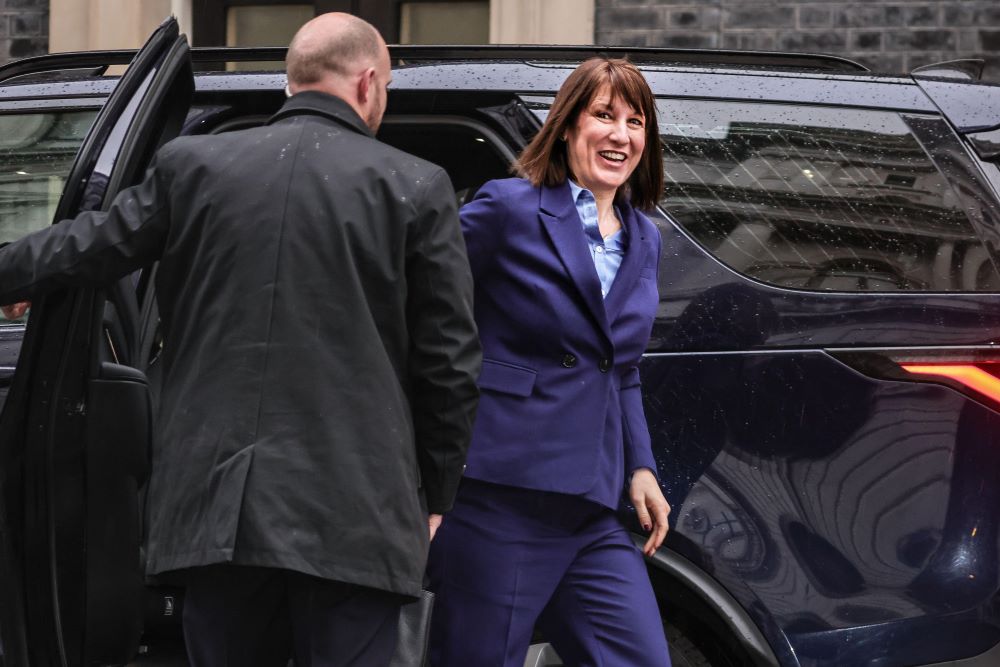"Good Chance" There'll Be Tax Rises To Fund Defence Spending Rise, Says Leading Economist
Prime minister Keir Starmer has indicated defence spending will rise following uncertainty over the US's support of Ukraine. (Alamy)
5 min read
Leading economist Paul Johnson believes "there's a good chance we'll have more tax rises" if Keir Starmer decides to significantly raise defence spending.
The Prime Minister is coming under growing pressure, including from some Labour MPs, to increase the amount of money the UK spends on defence in response to US President Donald Trump's approach to ending the war in Ukraine.
Trump has triggered alarm across Europe by holding negotiations with Russia about ending the conflict without inviting Ukraine and European nations to participate.
The returning president has also indicated that under his leadership, the US will play a reduced role in helping defend the West from aggressors like Russia.
Trump caused outrage on Wednesday when he described Ukrainian president Volodymyr Zelensky as "a dictator without elections", accusing him of doing a "terrible job".
Both Starmer and leader of the opposition Kemi Badenoch came to Zelensky's defence.
European leaders, including Starmer, held an emergency summit in Paris on Monday where they agreed that they needed to do more on defence.
Two Labour MPs, Laura Kyrke-Smith and Melanie Ward, argued in The House that the government's current plans to raise spending to 2.5 per cent of GDP were no longer sufficient and that the UK should look to Poland, which plans to reach 4.7 per cent this year.
There are concerns that an increase in defence spending could come at the expense of some departmental budgets at a time when they are already under pressure.
However, adding to the complication facing ministers, Chancellor Rachel Reeves has already said she won't be "coming back" for more tax rises after increasing employers' National Insurance contributions in the Autumn Budget.
Johnson, Director at the Institute for Fiscal Studies (IFS), told PoliticsHome that increasing defence spending without further rax rises would "squeeze" unprotected departments even more than they are now, "almost certainly" meaning "some cuts somewhere".
"On our calculations, based on the total spending envelope that Rachel Reeves set in the last Budget, it essentially means no space for any increases across unprotected departments, and if she goes further than that on defence, then that almost certainly means some cuts somewhere.
"These are all fairly marginal judgments. But essentially, she hasn't got much room for manoeuvre."
Asked whether he predicts there'll be further tax rises to help fund higher defence spending, Johnson said: "There's a good chance we'll have more tax rises, yes."
This, he said, is because further spending cuts feel "politically unrealistic" as unprotected departments have already faced deep cuts during austerity under the previous government.
"There are other options here," he said.
"One is to increase taxes. One is that the OBR (Office for Budget Responsibility) might just be nice and come up with more positive economic forecasts. It may be that our welfare budget falls. There are options for cutting welfare spending — again, politically difficult."
The leading economist said this new pressure will only make the upcoming spending review even more difficult for Reeves as she prepares to set out how much money departments will get over the next few years. "That's when things will get really hard," he told PoliticsHome.
 Chancellor of the Exchequer Rachel Reeves (Alamy)
Chancellor of the Exchequer Rachel Reeves (Alamy)
Stuart Hoddinott, senior researcher at the Institute for Government (IfG) think tank, said that "by definition", unprotected departments would need to be cut if defence spending rises and further tax rises aren't on the table.
"If you raise defence spending to 2.5 per cent of GDP, then that implies 2.6 per cent cuts in real terms to unprotected departments," he told PoliticsHome.
"If you raised a 3 per cent of GDP, then that's about 4.6 per cent cuts per year in real terms for unpredicts departments," said Hoddinott.
"They [unprotected departments] will have to find ways to make the spending balance.
"That will be through lower amounts of money provided to frontline services, lower grants provided to local authorities, and more restricted budgets for prisons.
"They'll be looking for ways to implement those cuts."
However, like Johnson, Hoddinott pointed out that departments had already faced spending cuts as a result of the previous Conservative government's austerity policies.
"There have been 14 years of relatively tight budgets...
"A lot of the low-hanging fruit, the easy efficiency savings, will have been realised, and it'll be much harder now to make savings across those services.
"It will require things like cuts to adults and children's social care, most likely, both of which are really struggling. There will be cuts to the court system, which has already got a record backlog, meaning a slowing down in cases being brought and more pressure in prisons."
Sophia Gaston, UK Foreign Policy Lead at the Australian Strategic Policy Institute (ASPI) defence think tank, told PoliticsHome it was "vital" the UK increases spending on defence, describing a "profound deterioration of the geopolitical landscape".
"Either we are on the frontline of the efforts to face down the threat of rising authoritarian powers, or we will find ourselves tiny minnows in a much more dangerous environment where we cannot protect our vital security," said Gaston.
Gaston also said an increase in defence spending could unlock some economic benefits for the government.
"The government should appoint someone to work specifically on this issue so we can break this destructive zero-sum competition between our international and domestic spending," said Gaston.
"If defence investments can help boost our R&D, science and tech, and manufacturing sectors, then the government will be closer to achieving the growth it needs to deliver on public services and domestic priorities."
PoliticsHome Newsletters
PoliticsHome provides the most comprehensive coverage of UK politics anywhere on the web, offering high quality original reporting and analysis: Subscribe
